高中英语句子成分分析_直接打印版
- 格式:doc
- 大小:157.00 KB
- 文档页数:24

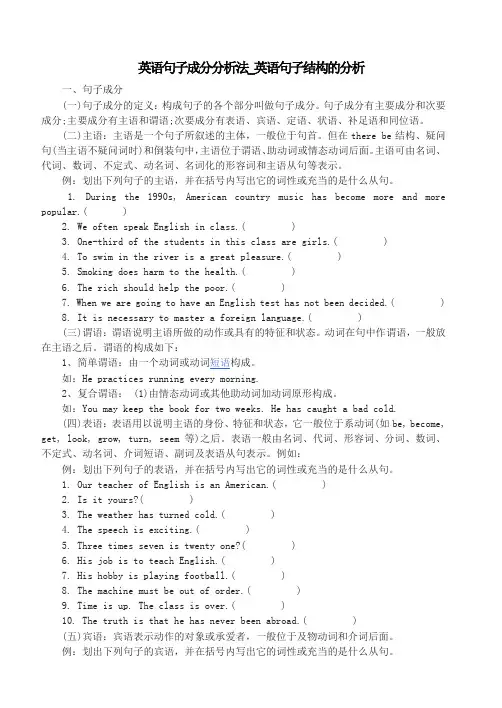
英语句子成分分析法_英语句子结构的分析一、句子成分(一)句子成分的定义:构成句子的各个部分叫做句子成分。
句子成分有主要成分和次要成分;主要成分有主语和谓语;次要成分有表语、宾语、定语、状语、补足语和同位语。
(二)主语:主语是一个句子所叙述的主体,一般位于句首。
但在there be结构、疑问句(当主语不疑问词时)和倒装句中,主语位于谓语、助动词或情态动词后面。
主语可由名词、代词、数词、不定式、动名词、名词化的形容词和主语从句等表示。
例:划出下列句子的主语,并在括号内写出它的词性或充当的是什么从句。
1. During the 1990s, American country music has become more and more popular.( )2. We often speak English in class.( )3. One-third of the students in this class are girls.( )4. To swim in the river is a great pleasure.( )5. Smoking does harm to the health.( )6. The rich should help the poor.( )7. When we are going to have an English test has not been decided.( )8. It is necessary to master a foreign language.( )(三)谓语:谓语说明主语所做的动作或具有的特征和状态。
动词在句中作谓语,一般放在主语之后。
谓语的构成如下:1、简单谓语:由一个动词或动词短语构成。
如:He practices running every morning.2、复合谓语: (1)由情态动词或其他助动词加动词原形构成。
如:You may keep the book for two weeks. He has caught a bad cold.(四)表语:表语用以说明主语的身份、特征和状态,它一般位于系动词(如be, become, get, look, grow, turn, seem等)之后。
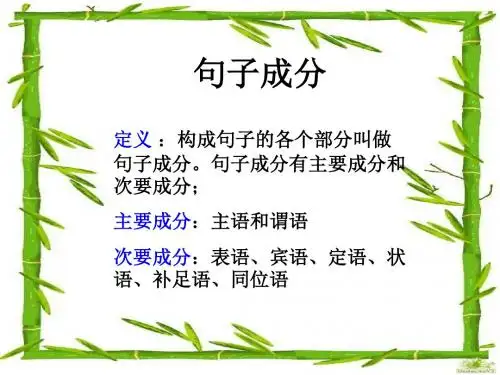
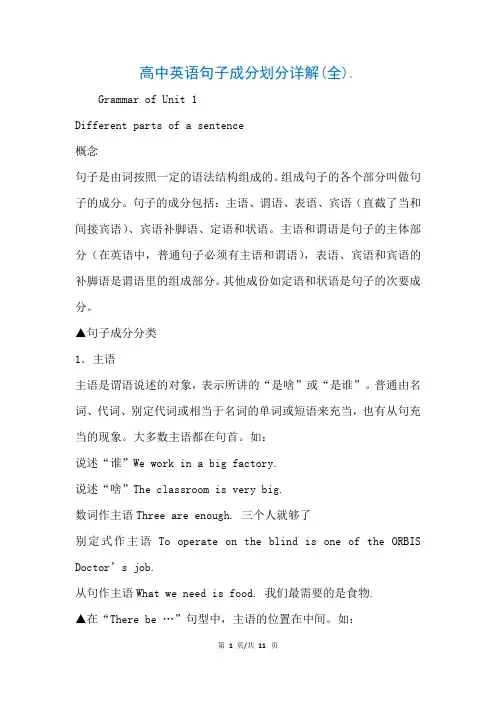
高中英语句子成分划分详解(全).Grammar of Unit 1Different parts of a sentence概念句子是由词按照一定的语法结构组成的。
组成句子的各个部分叫做句子的成分。
句子的成分包括:主语、谓语、表语、宾语(直截了当和间接宾语)、宾语补脚语、定语和状语。
主语和谓语是句子的主体部分(在英语中,普通句子必须有主语和谓语),表语、宾语和宾语的补脚语是谓语里的组成部分。
其他成份如定语和状语是句子的次要成分。
▲句子成分分类1.主语主语是谓语说述的对象,表示所讲的“是啥”或“是谁”。
普通由名词、代词、别定代词或相当于名词的单词或短语来充当,也有从句充当的现象。
大多数主语都在句首。
如:说述“谁”We work in a big factory.说述“啥”The classroom is very big.数词作主语Three are enough. 三个人就够了别定式作主语To operate on the blind is one of the ORBIS Doctor’s job.从句作主语What we need is food. 我们最需要的是食物.▲在“There be …”句型中,主语的位置在中间。
如:There are some bottles of milk in the box.▲在个不句型中,主语在整个句子后面,这时前面用it作形式主语。
如:It is very interesting to play the game called “treat or trick”.It took two workers about three months to build the house. 2.谓语谓语时用来讲明主语“做啥”、“是啥”或“如何样”,谓语必须是动词,谓语和主语在“人称”和“数”两方面必须一致。
如:He is very generous. She looks very smart and coolWe have finished the job. He can speak German.3.表语表语讲明主语“是啥”或“如何样”,由名词、形容词、介词、副词、别定式及相当于名词的词或短语来充当,它的位置在系动词后面。
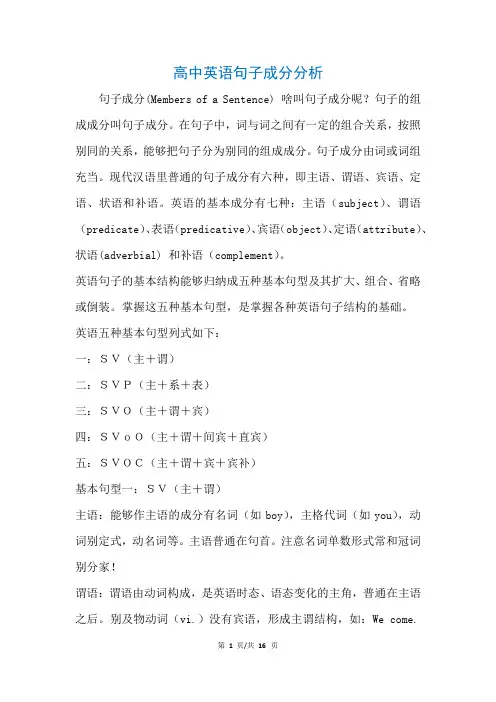
高中英语句子成分分析句子成分(Members of a Sentence) 啥叫句子成分呢?句子的组成成分叫句子成分。
在句子中,词与词之间有一定的组合关系,按照别同的关系,能够把句子分为别同的组成成分。
句子成分由词或词组充当。
现代汉语里普通的句子成分有六种,即主语、谓语、宾语、定语、状语和补语。
英语的基本成分有七种:主语(subject)、谓语(predicate)、表语(predicative)、宾语(object)、定语(attribute)、状语(adverbial) 和补语(complement)。
英语句子的基本结构能够归纳成五种基本句型及其扩大、组合、省略或倒装。
掌握这五种基本句型,是掌握各种英语句子结构的基础。
英语五种基本句型列式如下:一:SV(主+谓)二:SVP(主+系+表)三:SVO(主+谓+宾)四:SVoO(主+谓+间宾+直宾)五:SVOC(主+谓+宾+宾补)基本句型一:SV(主+谓)主语:能够作主语的成分有名词(如boy),主格代词(如you),动词别定式,动名词等。
主语普通在句首。
注意名词单数形式常和冠词别分家!谓语:谓语由动词构成,是英语时态、语态变化的主角,普通在主语之后。
别及物动词(vi.)没有宾语,形成主谓结构,如:We come.此句型的句子有一具共同特点,即句子的谓语动词都能表达完整的意思。
这类动词叫做别及物动词,后面能够跟副词、介词短语、状语从句等。
S│V(别及物动词)1. The sun │was shining. 太阳在照射着。
2. The moon │rose. 月亮升起了。
3. The universe │remains. 宇宙长存。
4. We all │breathe, eat, and drink. 我们大伙儿都呼吸、吃和喝。
5. Who │cares? 管它呢?6. What he said │doe s not matter. 他所说的没有啥关系。
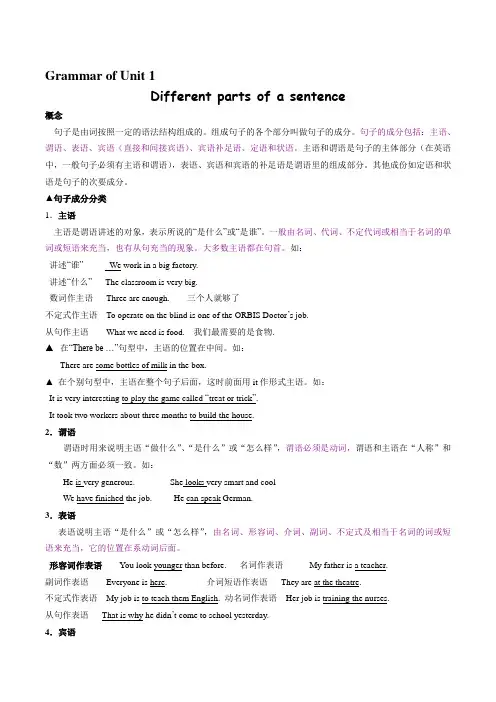
Grammar of Unit 1Different parts of a sentence概念句子是由词按照一定的语法结构组成的。
组成句子的各个部分叫做句子的成分。
句子的成分包括:主语、谓语、表语、宾语(直接和间接宾语)、宾语补足语、定语和状语。
主语和谓语是句子的主体部分(在英语中,一般句子必须有主语和谓语),表语、宾语和宾语的补足语是谓语里的组成部分。
其他成份如定语和状语是句子的次要成分。
▲句子成分分类1.主语主语是谓语讲述的对象,表示所说的“是什么”或“是谁”。
一般由名词、代词、不定代词或相当于名词的单词或短语来充当,也有从句充当的现象。
大多数主语都在句首。
如:讲述“谁”We work in a big factory.讲述“什么”The classroom is very big.数词作主语Three are enough. 三个人就够了不定式作主语To operate on the blind is one of the ORBIS Doctor’s job.从句作主语What we need is food. 我们最需要的是食物.▲在“There be …”句型中,主语的位置在中间。
如:There are some bottles of milk in the box.▲在个别句型中,主语在整个句子后面,这时前面用it作形式主语。
如:It is very interesting to play the game called “treat or trick”.It took two workers about three months to build the house.2.谓语谓语时用来说明主语“做什么”、“是什么”或“怎么样”,谓语必须是动词,谓语和主语在“人称”和“数”两方面必须一致。
如:He is very generous. She looks very smart and coolWe have finished the job. He can speak German.3.表语表语说明主语“是什么”或“怎么样”,由名词、形容词、介词、副词、不定式及相当于名词的词或短语来充当,它的位置在系动词后面。
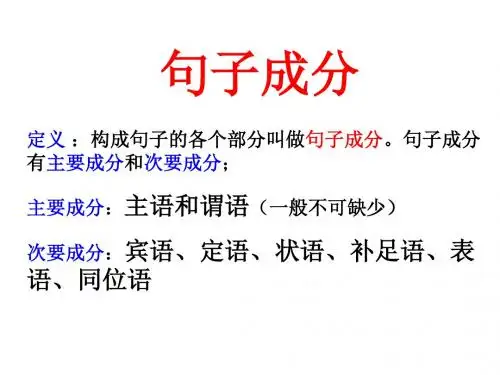
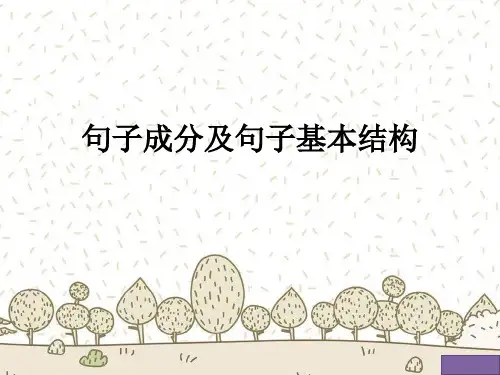
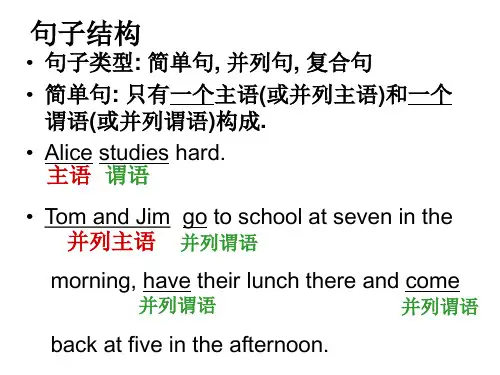
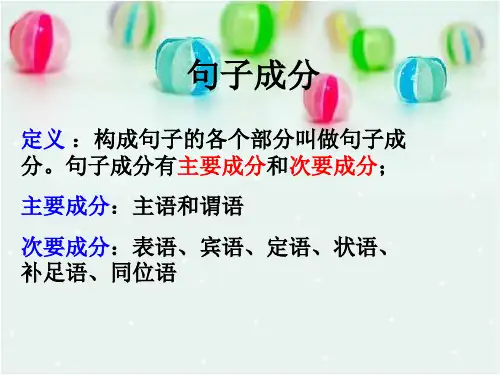
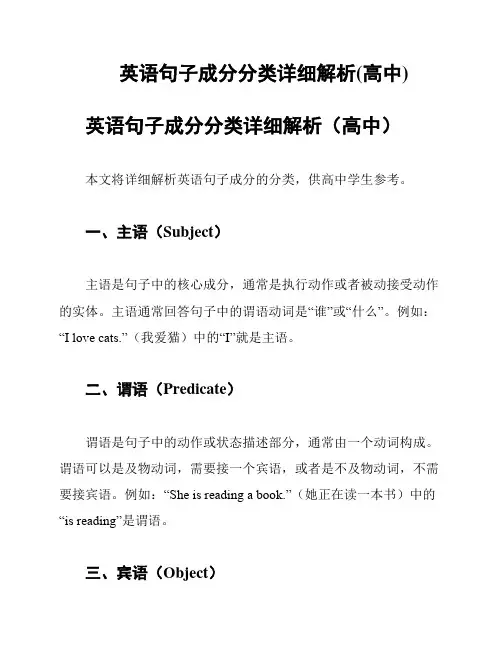
英语句子成分分类详细解析(高中)英语句子成分分类详细解析(高中)本文将详细解析英语句子成分的分类,供高中学生参考。
一、主语(Subject)主语是句子中的核心成分,通常是执行动作或者被动接受动作的实体。
主语通常回答句子中的谓语动词是“谁”或“什么”。
例如:“I love cats.”(我爱猫)中的“I”就是主语。
二、谓语(Predicate)谓语是句子中的动作或状态描述部分,通常由一个动词构成。
谓语可以是及物动词,需要接一个宾语,或者是不及物动词,不需要接宾语。
例如:“She is reading a book.”(她正在读一本书)中的“is reading”是谓语。
三、宾语(Object)宾语是谓语动词所作用的对象,它通常回答谓语动词的动作的“谁”或“什么”。
宾语可以是直接宾语或间接宾语。
直接宾语直接接在动词后,间接宾语通常通过介词与动词相关联。
例如:“He gave me a gift.”(他给了我一份礼物)中的“gift”是直接宾语,“me”是间接宾语。
表语是补充说明主语的成分,通常位于系动词之后。
表语可以是形容词、名词、副词等。
例如:“She is beautiful.”(她很漂亮)中的“beautiful”是表语。
五、状语(Adverbial)状语是修饰动词、形容词、副词或句子的成分,用来描述动作的方式、时间、地点、原因等。
状语可以放在句子的不同位置。
例如:“I often go to the park.”(我经常去公园)中的“often”就是状语。
六、定语(Adjective Modifier)定语是用来修饰名词或代词的成分,通常位于被修饰的名词或代词之前。
定语可以是形容词、名词、代词、分词等。
例如:“The red car is fast.”(红色的车跑得很快)中的“red”是定语。
七、同位语(Appositive)同位语是对某个名词或代词进行解释或补充说明的成分,通常置于被解释的名词或代词之后并用逗号隔开。
高考英语句子成分结构分析英语的句子成分主要有六种:即主语、谓语、宾语、定语、状语和补语。
(可以熟记为:主谓宾,定状补)除了这六种主要成分之外,还有“表语”和“同位语”的说法。
但表语和系动词一起作谓语,因此划分成分时,划分在谓语上。
同位语分为主语同位语和宾语同位语,属于主语或宾语的一部分。
一、划分句子成分时的常用符号英语中划分句子成分的符号主语在下面画直线谓语在下面画曲线宾语在下面画双横线定语在下面画虚线(一行点使我们想到一排钉子,“钉”谐音为“定语”的“定”)状语下面为短横线(短横线使我们想到短木桩,木桩撞(状)钟)补语上一短横,下一短横(下一短横好像是为了弥补上面短横间的空隙)同位语上下双曲线(都有曲折,上下位置基本相同)1. 主语主语是一个句子所叙述的主体,一般位于句首,通常由名词性的词来充当。
可以作主语的词性或语法结构:1. 名词2. 代词3. 数词4. 不定式5. 动名词6. 主语从句等表示。
7. 名词化的形容词(如the rich)在英语中,形容词、副词和介词短语是不能作主语的。
如果它们在句首时,句子可能是倒装句,真正的主语在后面。
On the desk are some books. (主语是books,所以用are)Down jumps the boy. (主语是the boy,所以用jumps )Gone are the days. (主语是the days,所以用are)练习:在下面句子的主语下面画横线,并说出由什么充当。
1. During the 1990s, American country music has become more and more popular.2. We often speak English in class.3. One-third of the students in this class are girls.4. To swim in the river is a great pleasure.5. Smoking does harm to the health.6. The rich should help the poor.7. When we are going to have English test has not been decided.8. It is necessary to master a foreign language.9. That he isn’t at home is not true.10. There comes the bus.11. Beyond the village lies a small village.12. Now comes your turn.2. 谓语谓语由动词充当,说明主语所做的动作或具有的特征和状态。
Part1英语句子成分一、词类英语词类分十种:名词、形容词、代词、数词、冠词、动词、副词、介词、连词、感叹词。
1、名词(n.):表示人、事物、地点或抽象概念的名称。
如:boy, morning, bag, ball, class, orange.2、代词(pron.):主要用来代替名词。
如:who, she, you, it .3、形容词(adj..):表示人或事物的性质或特征。
如:good, right, white, orange .4、数词(num.):表示数目或事物的顺序。
如:one, two, three, first, second, third, fourth.5、动词(v.):表示动作或状态。
如:am, is,are,have,see .6、副词(adv.):修饰动词、形容词或其他副词,说明时间、地点、程度等。
如:now, very, here, often, quietly, slowly.7、冠词(art..):用在名词前,帮助说明名词。
如:a, an, the.8、介词(prep.):表示它后面的名词或代词与其他句子成分的关系。
如in, on, from, above, behind.9、连词(conj.):用来连接词、短语或句子。
如and, but, before .10、感叹词(interj..)表示喜、怒、哀、乐等感情。
如:oh, well, hi, hello.二、句子成分1.主语:是句子要说明的人或事物,是句子的主体,一般由名词、代词、数词、不定式或动名词等充当。
如:The car is running fast. / The girl can sing many English songs.(名词)We are students. / This is my pen . Yours is on the desk.(代词)One of my classmates is from Shanghai. / Two and three is five.(数词)The blind need more help.(名词化的形容词)It's bad manners to spit in public. (不定式)Eating too much is bad for your health.(动名词)【注意】若不定式短语作主语常用it作形式主语,而把真正的主语(不定式短语)放在句后。
1 句子成分(Members of a Sentence) 什么叫句子成分呢?句子的组成成分叫句子成分。在句子中,词与词之间有一定的组合关系,按照不同的关系,可以把句子分为不同的组成成分。句子成分由词或词组充当。现代汉语里一般的句子成分有六种,即主语、谓语、宾语、定语、状语和补语。英语的基本成分有七种:主语(subject)、谓语(predicate)、表语(predicative)、宾语(object)、定语(attribute)、状语(adverbial) 和补语(complement)。 英语句子的基本结构可以归纳成五种基本句型及其扩大、组合、省略或倒装。掌握这五种基本句型,是掌握各种英语句子结构的基础。 英语五种基本句型列式如下: 一: S V (主+谓) 二: S V P (主+系+表) 三: S V O (主+谓+宾) 四: S V o O (主+谓+间宾+直宾) 五: S V O C (主+谓+宾+宾补) 基本句型 一:S V (主+谓) 主语:可以作主语的成分有名词(如boy),主格代词(如you),动词不定式,动名词等。主语一般在句首。注意名词单数形式常和冠词不分家! 谓语:谓语由动词构成,是英语时态、语态变化的主角,一般在主语之后。不及物动词(vi.)没有宾语,形成主谓结构,如:We come. 此句型的句子有一个共同特点,即句子的谓语动词都能表达完整的意思。这类动词叫做不及物动词,后面可以跟副词、介词短语、状语从句等。 S │ V (不及物动词) 1. The sun │was shining. 太阳在照耀着。 2. The moon │rose. 月亮升起了。 3. The universe │remains. 宇宙长存。 4. We all │breathe, eat, and drink. 我们大家都呼吸、吃和喝。 5. Who │cares? 管它呢? 6. What he said │does not matter. 他所讲的没有什么关系。 7. They │talked for half an hour. 他们谈了半个小时。 8. The pen │writes smoothly 这支笔书写流利。
基本句型 二: S V P (主+系+表) 此句型的句子有一个共同的特点:句子谓语动词都不能表达一个完整的意思,必须加上一个表明主语身份或状态的表语构成复合谓语,才能表达完整的意思。这类动词叫做连系动词。系动词分两类:be, look, keep, seem等属一类,表示情况;get, grow, become, turn等属另一类,表示变化。be 本身没有什么意义,只起连系主语和表语的作用。其它系动词仍保持其部分词义。感官动词多可用作联系动词:look well/面色好,sound nice/听起来不错,feel good/感觉好,smell bad/难闻 S │V(是系动词)│ P 1. This │is │an English-Chinese dictionary. 这是本英汉辞典。 2. The dinner │smells │good. 午餐的气味很好。 3. He │fell │in love. 他堕入了情网。 4. Everything │looks │different. 一切看来都不同了。 5. He │is growing │tall and strong. 他长得又高又壮 6. The trouble│is │that they are short of money. 麻烦的是他们缺少钱。 7. Our well │has gone │dry. 我们井干枯了。 8. His face │turned │red. 他的脸红了。 There be 结构: There be 表示‘存在有’。这里的there没有实际意义,不可与副词‘there那里’混淆。 此结构后跟名词,表示‘(存在)有某事物’ 试比较:There is a boy there.(那儿有一个男孩。)/前一个there无实意,后一个there为副词‘那里’。
基本句型 三: S V O (主+谓+宾) 此句型句子的共同特点是:谓语动词都具有实义,都是主语产生的动作,但不能表达完整的意思,必须跟有一个宾语,即动作的承受者,才能使意思完整。这类动词叫做及物动词。宾语位于及物动词之后,一般同主语构成一样, 2
不同的是构成宾语的代词必须是‘代词宾格’,如:me,him,them等 S │V(及物动词)│ O 1. Who │knows │the answer? 谁知道答案? 2. She │smiled │her thanks. 她微笑表示感谢。 3. He │has refused │to help them. 他拒绝帮他们。 4. He │enjoys │reading. 他喜欢看书。 5. They │ate │what was left over. 他们吃了剩饭。 6. He │said │"Good morning." 他说:"早上好!" 7. I │want │to have a cup of tea. 我想喝杯茶。 8. He │admits │that he was mistaken. 他承认犯了错误。 基本句型 四: S V o O (主+谓+间宾+直宾) 有些及物动词可以有两个宾语,如:give给,pass递,bring带,show显示。这两个宾语通常一个指人,为间接宾语;一个指物,为直接宾语。间接宾语一般位于直接宾语之前。 一般的顺序为:动词 + 间接宾语 + 直接宾语。如:Give me a cup of tea,please. 强调间接宾语顺序为:动词 + 直接宾语 +介词+ 间接宾语。如: Show this house to Mr.Smith. 若直接宾语为人称代词:动词+ 代词直接宾语 +介词+ 间接宾语。如:Bring it to me,please. S │V(及物)│ o(多指人) │ O(多指物) 1. She │ordered │herself │a new dress. 她给自己定了一套新衣裳。 2. She │cooked │her husband │a delicious meal. 她给丈夫煮了一顿美餐。 3. He │brought │you │a dictionary. 他给你带来了一本字典。 4. He │denies │her │nothing. 他对她什么都不拒绝。 5. I │showed │him │my pictures. 我给他看我的照片 6. I │gave │my car │a wash. 我洗了我的汽车。 7. I │told │him │that the bus was late. 我告诉他汽车晚点了。 8. He │showed │me │how to run the machine. 他教我开机器。 基本句型 五: S V O C (主+谓+宾+宾补) 此句型的句子的共同特点是:动词虽然是及物动词,但是只跟一个宾语还不能表达完整的意思,必须加上一个补充成分来补足宾语,才能使意思完整。 宾语补足语:位于宾语之后对宾语作出说明的成分。宾语与其补足语有逻辑上的主谓关系,它们一起构成复合宾语。 名词/代词宾格 + 名词 The war made him a soldier./战争使他成为一名战士. 名词/代词宾格 + 形容词 New methods make the job easy./新方法使这项工作变得轻松. 名词/代词宾格 + 介词短语 I often find him at work./我经常发现他在工作. 名词/代词宾格 + 动词不定式 The teacher ask the students to close the windows./老师让学生们关上窗户. 名词/代词宾格 + 分词 I saw a cat running across the road./我看见一只猫跑过了马路. S │V(及物)│ O(宾语) │ C(宾补) 1. They │appointed │him │manager. 他们任命他当经理。 2. They │painted │the door │green. 他们把门漆成绿色 3. This │set │them │thinking. 这使得他们要细想一想。 4. They │found │the house │deserted. 他们发现那房子无人居住。 5. What │makes │him │think so? 他怎么会这样想? 6. We │saw │him │out. 我们送他出去 7. He │asked │me │to come back soon. 他要我早点回来。 8. I │saw │them │getting on the bus. 我看见他们上了那辆公共汽车。
但常用的英语句子并不都象基本句型这样简短,这些句子除了基本句型的成分不变外,通常是在这些成分的前面或后面增加一些修饰语(modifier)而加以扩大。这些修饰语可以是单词(主要是形容词、副词和数词),也可以是各种类型的短语(主要是介词短语、不定式短语和分词短语)。我们称之为:定语、 3
状语 一、 定语:定语是对名词或代词起修饰、限定作用的词、短语或句子,汉语中常用‘……的’表示。定语通常位于被修饰的成分前。若修饰some,any,every,no构成的复合不定代词时,(如:something、nothing);或不定式、分词短语作定语、从句作定语时,则定语通常置后。副词用作定语时须放在名词之后。 形容词作定语: The little boy needs a blue pen.(little修饰名词boy;blue修饰名词pen.)/小男孩需要一支兰色的钢笔。 Tom is a handsome boy./Tom是个英俊的男孩。 There is a good boy./有个乖男孩。 数词作定语相当于形容词: Two boys need two pens./两个男孩需要两支钢笔。 The two boys are students./这两个男孩是学生。 There are two boys in the room./房间里有两个男孩。 代词或名词所有格作定语: His boy needs Tom\'s pen./他的男孩需要Tom的钢笔。 His name is Tom./他的名字是汤姆。 There are two boys of Toms there./那儿有Tom家的两个男孩。 介词短语作定语: The boy in the classroom needs a pen of yours./教室里的男孩需要你的一支钢笔。 The boy in blue is Tom./穿兰色衣服的孩子是汤姆。 There are two boys of 9,and three of 10./有两个9岁的,三个10岁的男孩。 名词作定语: The boy needs a ball pen./男孩需要一支圆珠笔。 It is a ball pen./这是一支圆珠笔。 There is only one ball pen in the pencil box./这铅笔盒里只有一支圆珠笔。 副词作定语: The boy there needs a pen./那儿的男孩需要一支钢笔。 The best boy here is Tom./这里最棒的男孩是Tom。 不定式作定语: The boy to write this letter needs a pen./写这封信的男孩需要一支钢笔。 The boy to write this letter is Tom./将要写这封信的男孩是汤姆。 There is nothing to do today./今天无事要做。 分词(短语)作定语: The smiling boy needs a pen bought by his mother./那个微笑的男孩需要一支他妈妈买的钢笔。 The pen bought by her is made in China./她买的笔是中国产的。 There are five boys left./有五个留下的男孩。 定语从句: The boy who is reading needs the pen which you bought yesterday./那个在阅读的男孩需要你昨天买的钢笔。 The boy you will know is Tom./你将认识的男孩叫汤姆。 There are five boys who will play the game./参加游戏的男孩有五个。 二、状语:状语修饰动词、形容词、副词或全句,说明方式、因果、条件、时间、地点、让步、方向、程度、目的等。 状语在句子中的位置很灵活,常见情况为:通常在句子基本结构之后,强调时放在句首;修饰形容词或副词时,通常位于被修饰的词之前;表示时间、地点、目的的状语一般位于句子两头,强调时放在句首,地点状语一般须在时间状语之前;一些表示不确定时间(如:often)或程度(如:almost)的副词状语通常位于be动词、助动词、情态动词之后,动词之前。 有时状语在句中的某个位置会引起歧义,应注意,如:The boy calls the girl in the classroom.一般理解成‘男孩喊教室里的女孩‘(此时in the classroom为girl的定语),也可以理解为‘男孩在教室里喊女孩’(此时in the classroom为地点状语),最好写作‘In the classroom,the boy calls the girl.\' 副词(短语)作状语: The boy needs a pen very much./男孩非常需要一支钢笔。(程度状语) The boy needs very much the pen bought by his mother./男孩非常需要他母亲买的那支钢笔。(宾语较长则状语前置) The boy really needs a pen./男孩真的需要一支钢笔。(程度状语)